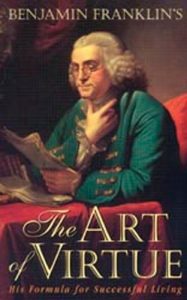Benjamin Franklin’s the Art of Virtue
Ever wonder what make Franklin tick? What got him up in the morning? What he thought about? What was important to him? Would you like to know the book changed his life and turn of thinking it gave him that guided his every endeavor?
The Art of Virtue captures in Franklin’s own words his timeless thoughts on topics such as goal setting, personal achievement, obtaining wealth, preserving health, human relations, family living, religion, morality, aging and dying. Wit, wisdom and humor grace every page--entertaining, informing and inspiring the reader.
Consider this quote on happiness: “. . .as the happiness or real good of men consists in right action and right action cannot be produced without right opinion, it behooves us, above all things in this world, to take care that our own opinions of things be according to the nature of things. The foundation of all virtue and happiness is thinking rightly.” Imagine how much easier our lives would be if we simply observed this one idea.
Contemplate this thought on education he published in 1728, “It is said the Persians in their constitution, had public schools in which virtue was taught as a liberal art or science, and it is certainly of more consequence to a man, that he has learnt to govern his passions in spite of temptation, to be just in his dealings, to be temperate in his pleasures, to support himself with fortitude under misfortunes, to behave in prudence in all his affairs and every circumstance in life; I say, it is of much more real advantage to be thus qualified, than to be master of all the arts and sciences in the world beside.”
How might the world be improved if this were a primary objective of public education?
On finance, Franklin wrote, “Gain may be temporary and uncertain, but ever, while you live, expense is constant and certain; and it is easier to build two fireplaces than keep one in fuel; as Poor Richard says; so, rather go to bed supper less than to rise in debt.” Know anyone who could benefit from that advice?
When serving as an ambassador to France during the Revolutionary War, Franklin received a letter warning him his valet was a spy for the French. He replied, “I have observed one rule which prevents any inconvenience from such practices. It is simply this—to be concerned in no affairs that I would blush to have made public and to do nothing but spies may see and welcome. When a man’s actions are just and honorable, the more they are known, the more his reputation is increased and established.” Know anyone whose life would have been made simpler by having been guided by a similar rule?
In writing to a friend a story from his youth in which he spent all his money for a whistle only to learn he could have bought the same whistle for a fraction of the price at a local store said that it proved to be a valuable advantage to him as he there after tried to avoid paying too much for his whistles. After observing several instances in life where he had observed individuals who paid too much for their whistles, he concluded, “In short, I conceive that a great part of the miseries of mankind are brought upon them by the false estimate they have made of the value of things, and by their paying too much for their whistles.”
Dr. Steven R. Covey wrote of the book, “An inspiring classic! Benjamin Franklin’s wit and wisdom brilliantly organized around today’s challenges.” Which is the important key to the value of Benjamin Franklins the Art of Virtue--it addresses problems we are experiencing as individuals on a daily basis in today’s world.






